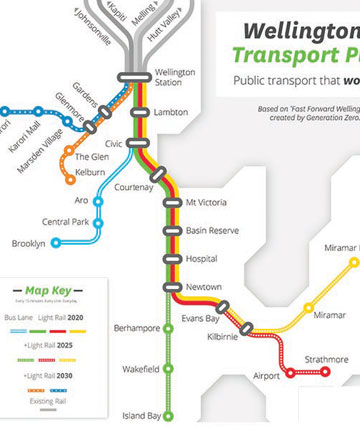Most transport policy discussions this election have focused on Auckland. So it was great to see that the Green Party has today released its Wellington transport policy.
As reported in the Dominion Post, the Greens’ plan is centred on a light rail system for Wellington, including light rail to the airport by 2025, and includes the retention of trolleybuses and the provision of new electric buses. There’s also money for cycleways and footpaths, and the funding comes from money National has earmarked for motorways. The plan is based on Generation Zero’s Fast Forward Wellington plan – another big tick for the effectiveness of Generation Zero’s transport lobbying.
New Zealand First also supports a light rail link to Wellington airport, and the centrepiece of its transport policy is a Railways of National Importance programme.
Labour’s Phil Twyford is reported in today’s Dominion Post as saying that Labour will concentrate on funding public transport, specifically bus rapid transit. Wellington Central MP Grant Robertson, who like the Green’s Julie Anne Genter, has been a strong opponent of plans to build a Basin Reserve flyover, has said that “Labour is committed to building a 21st Century integrated public transport network for Wellington” and that “Labour will support evidence based solutions that reduce traffic congestion and integrate public transport improvements.”
The Mana Movement makes a strong commitment to public transport in the nation’s cities: “Develop free and frequent integrated public transport systems in all major population centres, including buses, rail, ferries, walkways, and cycle lanes, to increase the use of public transport, eliminate gridlock problems.”
I couldn’t find the Internet Party’s transport policy as a separate document, but in their environment policy they have expressed support for smart and sustainable transport solutions.
United Future’s transport policy calls for the completion of the Roads of National Significance, but Peter Dunne has frequently expressed his opposition to a Basin Reserve flyover.
So those are the transport polices from the parties that oppose a Basin Reserve flyover. In contrast, apart from some welcome money for cycleways, National is still fixated on its Roads of National Significance – even ACT, with its call for benefit-cost ratios to be strictly applied, is arguably better. (I was unable to find transport policies for the Maori and Conservative parties.)
This may have been a murky election campaign, but on transport, there are clear choices between parties that support sustainable transport options, and those – primarily National – that want a future of more motorways and continued adherence to failed and outdated transport solutions.
